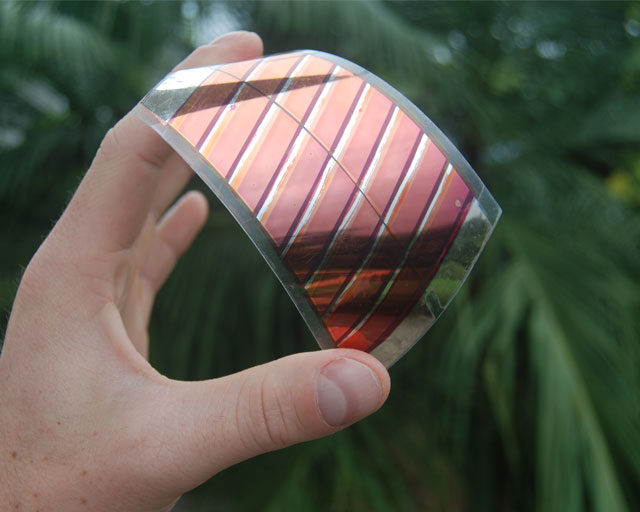Flexsolar and Fraunhofer IAP develop flexible organic solar cells in Brazil
Fraunhofer takes energy from the roll to Brazil
Brazil is increasingly investing in alternative energy because of its good economic situation. The conversion of solar energy into electricity is an important part of this strategy. Organic photovoltaics are intended to provide areas of Brazil marked by poor infrastructure with electricity. This includes not only light, but also the access to modern means of communication such as computers and smartphones. Therefor, the Brazilian company Flexsolar in Joinville and the German Fraunhofer Institute for Applied Polymer Research IAP in Potsdam-Golm develop flexible organic solar cells in a joint project. Flexsolar is going to produce the needed amounts of solar photovoltaic elements in a continuous roll-to-roll printing process. The techniques and procedures required will be developed by the Fraunhofer IAP. In this context, the Potsdam Fraunhofer Institute is going to install a pilot plant in Brazil. The German researchers will also develop processes for the production of customized organic solar cells. Flex Solar will advance product development and marketing in South America. The contract for the project was signed on October 3, 2012, at the Brazilian headquarters in Joinville (Santa Catarina).
Photovoltaic applications are currently supported by the Brazilian government within the framework of “Luz para todos” – “Light for All”. The development project focuses in particular on power supplies based on renewable energy for villages in rural and remote areas, thus making an important contribution to meet the high energy demand in the sunny Brazil. The photovoltaic elements needed have to be light, inexpensive and in many cases flexible as well, so they can be installed, for example, on school satchels. Also, elements for larger areas are planned, for example for recharging laptop accumulators.
For the production of photovoltaic elements the partners will apply a roll-to-roll process. In contrast to conventional methods, in which each element is produced separately, this manufacturing technology is conducted in a continuous mode, comparable to a conveyor belt. The process is inexpensive, making the products also affordable for South American customers.“The relatively low investment costs for a distribution infrastructure as well as the fact that the solar power will enable stable connections to the internet are of great advantage. Thus, both the chances of the local economy and the education especially of children and adolescents will be improved noticeably”, confirmed Prof. Hans-Jörg Bullinger from the Fraunhofer-Gesellschaft.
“In a roll-to-roll process, the required layers are sequentially printed on a flexible backing layer, which runs continuously as an endless conveyor belt over rolls. In a final step, the layers are encapsulated airtight on the belt in order to protect the substances printed from oxygen”, explains Dr. Armin Wedel from Fraunhofer IAP.
The idea for this project was born during a visit of the Brazilian Bernard Schmidt on Fraunhofer IAP‘s stand at the trade fair LOPE-C 2012 (Large-area, Organic and Printed Electronics Convention) in June in Munich.“Then everything happened very quickly”, says Schmidt, CEO of Solarflex.“In less than two months we have developed a project concept together with the Fraunhofer IAP. And in early September, the funding assured”, Schmidt is pleased. First prototypes are already produced at Fraunhofer IAP‘s new Application Centre for Innovative Polymer Technologies which was inaugurated in 2012. Here, the institute can manufacture flexible organic devices on a new pilot plant.
The Fraunhofer Institute for Applied Polymer Research IAP in Potsdam-Golm specializes in research and development for the entire range of polymer applications. It supports companies and partners in the custom development and optimization of innovative and sustainable materials, processing aids and processes. In addition to the environmentally-friendly, economical production and processing of polymers in the laboratory and pilot plant scale, the Institute also offers the characterization of polymers. We focus on synthetic petroleum-based polymers as well as biopolymers and biobased polymers from renewable resources. The applications are versatile, ranging from biotechnology, medicine, pharmacy and cosmetics via electronics and optics to applications in packaging, environmental and wastewater engineering or the automotive, paper, construction and paint industry.
The company Cromotransfer in Joinville, Brazil, has been working over 15 years in the field of screen printing technology for textile and packaging industries. Innovative ideas, creativity, aesthetic products and above all quality are the characteristics which distinguish Cromotransfer from its competitors at home and abroad. As part of the technology development a subsidiary Flexsolar was established to transfer the printing technology in new innovative areas of application in the field of photovoltaics. Flexsolar will develop and produce innovative products based on organic photovoltaics for the South American market.
Last modified:


